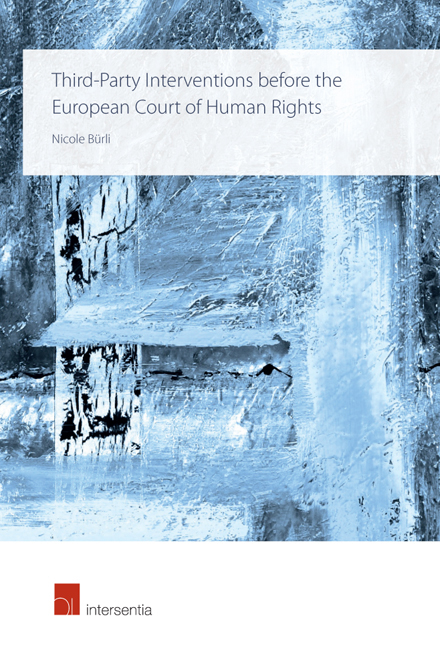 Third-Party Interventions before the European Court of Human Rights
Third-Party Interventions before the European Court of Human Rights Chapter 5 - Conclusion
Published online by Cambridge University Press: 29 September 2018
Summary
Over the last decades the Court has increasingly been engaged in constitutional decision- and law-making. The Court's judgments therefore do not just aff ect the parties to the particular case, but other member states, individuals and oft en European society at large. Unsurprisingly, a variety of entities try to participate in the Court's proceedings. The Court, in turn, has recognised that opening its doors to a myriad of interveners benefits its decision-making and enhances its legitimacy. It is against this background that the role of interventions has been shaped. In the following I shall summarise the role of interventions and their main implications.
THIRD-PARTY INTERVENTION: ONE TERM, THREE CONCEPTS
Under the term ‘third-party intervention’ the Court combines three diff erent concepts: amicus curiae, member-state and actual third-party intervention. As this study reveals, these types of intervention have very diff erent legal and philosophical roots. They therefore also diff er starkly in the role they play before the Court.
AMICUS CURIAE: STRENGTHEN THE COURT'S LEGITIMACY
The Court increasingly renders constitutional justice by deciding highly contested social and political issues such as gay marriage, assisted suicide or abortion. In so doing the Court frequently decides that national laws and practices that have been established in a democratic process are incompatible with the Convention. There is thus a tension between democracy and the Court's quasi- constitutional review. The Court can alleviate this tension by paying regard to constitutional features that have been developed in constitutional theory and by allowing members of civil society to contribute to these constitutional features. This reasoning is corroborated by data, revealing that amicus curiae contributes considerably to the constitutional features of argumentative representation, principled decision-making and acceptance of the Court's authority. It is thus the very role of amici curiae to strengthen the Court's legitimacy in its democratic environment.
With regard to principled decision-making, scholars have argued that the Court has to adhere to certain procedural safeguards, such as sound reasoning, consistent application of case law, transparency and accountability of rulings, subsidiarity, participation and neutrality. These scholars essentially argue for decision-making that takes into account constitutional principles of consistency, transparency etc.
- Type
- Chapter
- Information
- Third-Party Interventions before the European Court of Human RightsAmicus Curiae, Member-State and Third-Party Interventions, pp. 183 - 194Publisher: IntersentiaPrint publication year: 2017


